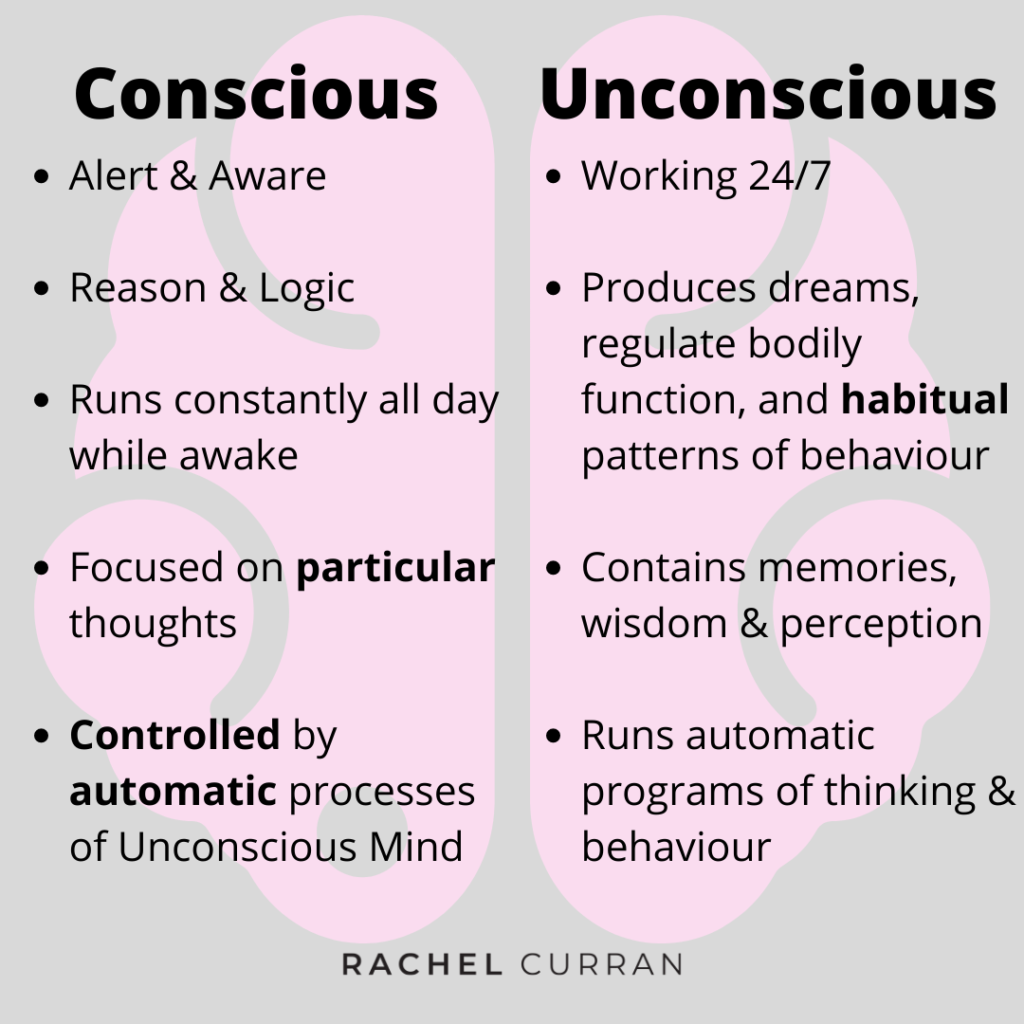
When we refer to our unconscious mind, we are talking about all the processes that happen within our mind below our level of conscious awareness.
Our conscious mind contains all of our thoughts, logic, feelings and memories that we acknowledge, whereas our unconscious contains the processes that run the conscious mind at a level that is deeper than which the conscious has access to.
Described in a Picture

The Conscious Mind
-
- Your conscious mind is that part of your mind that is always alert and aware.
- Your reason and logic (that you have learned) are stored here.
- It is running all day while you are awake, and is always focused on particular thoughts: what sandwich will I get? Why did my boss say that? I don’t know what to do about this? Do they like me? Why didn’t she text me back? I did really well in that presentation! Etc.
- NB: It is totally and completely controlled by the automatic processes of the unconscious mind.
The Unconscious Mind
- Works 24/7 during all waking and sleeping hours – can’t switch this bad boy off!
- Produces all of your dreams.
- Regulates your bodily functions (e.g. breathing, heartbeat, hormones) – this is why some people who have been struggling with fertility can have great success with Hypnotherapy which speaks directly to the unconscious mind.
- Your habitual patterns of behaviour, the things you do without thinking, are stored here.
- Stores your memories, in the way you experienced them at the time.
- The source of your wisdom.
- Your perception of the world operates from here.
- Runs the automatic programs of thinking and behaviour.
Why does any of this matter?
Well, in order to promote long lasting changes, the unconscious is the place to work!
As we can see from the above diagram, the unconscious controls the conscious, therefore there is not much value in us working on your Reason and Logic for example, as they are driven by much deeper processes within your unconscious. It is far more valuable, to focus on your deep beliefs, your perception of the world, and your behaviours – as by focusing on these, we can start to change the things you do automatically and consciously so that they benefit you and drive you towards your goals.
OK, so how am I supposed to do that?
It is very hard, if not impossible, to fully identify how the way we are operating internally is holding us back, that’s why coaching, therapy, and psychology as professions exist! It’s unconscious to us!
Neuro Linguistic Programming (NLP) or Hypnosis are two proven ways to work directly with the unconscious. Within NLP questions are asked in a very specific way so that they speak directly to your unconscious, to make which is unconscious conscious, and through the language clients use, practitioners are able to identify deep limiting beliefs within the client, and start to ask questions (again in a very specific way), that will support the client in creating new beliefs that benefit them.
Within hypnosis, Milton language is used to speak directly to the unconscious while the client is in a lucid or trance state. What this really means is that the Hypnotherapist will quieten down the conscious mind, to allow the unconscious to be heard by the client. The very specific language used by the Hypnotist will allow the client to access parts of his or her mind that usually are inaccessible. The hypnotist will also offer hypnotic suggestions for the purpose of healing and growth that the unconscious will fill with the most relevant pictures, sounds and feeling for the client, which are the primary ways that we as humans experience the world. New realizations and beliefs formed while in a hypnotic state create a new neural pathway, and provide the brain with options and different ways of behaving that are beneficial when in a conscious state.
The Power of the Unconscious
The job of our unconscious mind is to keep us safe and alive. That is it’s one goal!
So if our unconscious senses danger it will do everything within its power to stop us from the activity or thing that has ‘danger’ attached to it.
Now, through evolution this was great! When sabertooth lions were roaming around the earth we needed to be able to identify danger quickly, and create beliefs about what were safe ways of behaving and perception of danger vs safety, our unconscious stored all of this as it learnt it, so we didn’t have to access it consciously or be aware of it. We instinctively knew how to keep ourselves safe from sabertooth lions! So through evolution our bodies and brains learned that it was useful to make decisions about the world, and store them in our unconscious, and let that unconscious thinking drive us when in dangerous situations.
The only problem with this is that there are no sabertooth lions roaming the planet anymore, but our unconscious is still working the same way, and as we have grown up has identified things that were unsafe for us (perhaps speaking our mind in our family home), that now drives our current behavior based on old beliefs.
Therefore, when we identify old beliefs that don’t benefit us, and as we work to consciously change our supporting behaviours into something that does benefit us, our unconscious will scream at us because it senses danger is us doing something different than what is knows and has learnt is “safe”.
This is normal and to be expected as part of the change process.
Need to change the behaviour on purpose to change the belief and learn that new is ok not just ok and sae but beneficial





